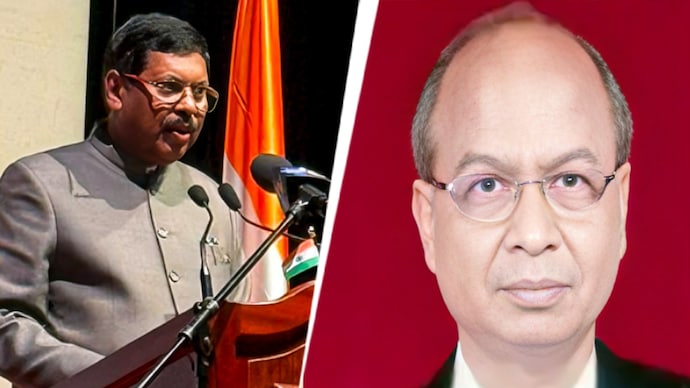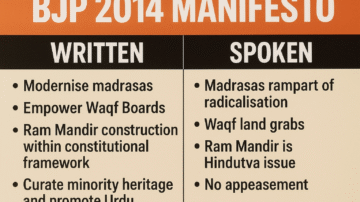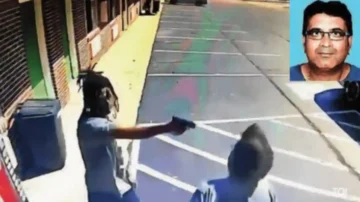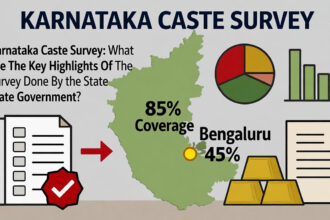
New Delhi: A dramatic incident unfolded in the Supreme Court of India on Monday when a lawyer attempted to hurl his shoe at Chief Justice of India (CJI) B.R. Gavai during routine court proceedings. The act, which has now sparked debate on judicial accountability, religious sensitivity, and political silence, was reportedly motivated by outrage over the CJI’s earlier remark related to Lord Vishnu and the Khajuraho temples.
- The Incident: Courtroom Shock
- Religious Motivation Behind the Outburst
- Police Response: No case filed against Adv. Rakesh Kishore
- Bar Council of India Suspends Advocate Kishore
- Rakesh Kishore’s Justification: “I Don’t Regret It”
- CJI Gavai’s Family and RSS Invitation
- Political Silence and Public Perception
- Double Standards or Institutional Deference?
- Broader Question: Free Speech and Accountability
- Final Thought: A Symbol of Growing Frustration
The Incident: Courtroom Shock
According to Bar & Bench reports, the man — later identified as Advocate Rakesh Kishore went near the dais during the mentioning of cases and attempted to remove his shoe and throw it toward the CJI.
Security personnel swiftly intervened and dragged him out of the courtroom before he could complete the act.
Despite the disruption, CJI Gavai remained unfazed, calmly asking the lawyers present to continue:
“Don’t get distracted by all this. We are not distracted. These things do not affect me.”
As security escorted him out, the lawyer reportedly shouted:
“Sanatan ka apman nahi sahenge” (We will not tolerate the insult of Sanatan Dharma).
Religious Motivation Behind the Outburst
The lawyer’s protest stemmed from remarks made by CJI Gavai on September 16, while dismissing a petition related to the restoration of a beheaded idol of Lord Vishnu at the Javari Temple in Khajuraho, Madhya Pradesh.
While rejecting the plea as “publicity interest litigation,” the CJI reportedly said:
“Go and ask the deity itself to do something now. You say you are a staunch devotee of Lord Vishnu. So go and pray now.”
Read More: When the Supreme Court Turns Against Faith: CJI Gavai, Ambedkarite Vows, and the Hindu Question
Growing outrage over CJI BR Gavai remarks on Lord Vishnu; Petitions sent to President
CJI BR Gavai faces backlash over Lord Vishnu Idol remark, Calls it “Misportrayed”
The comment drew widespread criticism and was perceived by many as insensitive toward Hindu beliefs.The Chief Justice later clarified in court that his remarks were being misinterpreted and reaffirmed that he “respects all religions” and believes in “true secularism.”
Police Response: No case filed against Adv. Rakesh Kishore
Police later identified the man as Advocate Rakesh Kishore, a senior lawyer in his 70s holding multiple bar association cards. According to a senior Delhi Police official quoted by Hindustan Times:
“He brought a paper as well, in which he wrote ‘Sanatan dharma ka apmaan, nahi sahega Hindustan.’ He was questioned for about three hours. However, no case has been filed as the Supreme Court office did not lodge any complaint. His shoe and documents were also returned.”
This decision to not press charges has raised eyebrows among both legal observers and members of the public.
Bar Council of India Suspends Advocate Kishore
While the Supreme Court refrained from pressing charges, the Bar Council of India (BCI) took swift disciplinary action, suspending Advocate Rakesh Kishore from legal practice. The BCI said the act of attempting to attack a sitting Chief Justice was “unacceptable” and “detrimental to the dignity of the legal profession.”
Rakesh Kishore’s Justification: “I Don’t Regret It”
Speaking to the media after his suspension, Advocate Rakesh Kishore said:
“I was hurt… I was not inebriated; this was my reaction to his action. I am not fearful. I don’t regret what happened.”
He explained that his act was born out of pain and devotion, not personal malice:
“A PIL was filed in the court of the CJI on 16th September. The CJI mocked it and said, ‘Go and pray to the idol and tell it to restore its own head.’ When a matter related to our Sanatan Dharma comes up, the SC passes such orders. Don’t provide relief to the petitioner, but don’t mock him either.”
When questioned about the caste based narrative that surfaced online after the incident, he responded sharply:
“My name is Dr. Rakesh Kishore. Can someone tell my caste? Maybe I am a Dalit too. It is one-sided that people are taking advantage of the fact that he (CJI Gavai) is a Dalit. He was a Sanatani Hindu first. He then renounced his faith and followed Buddhism. If he feels he has come out of Hinduism after following Buddhism, how is he still a Dalit? This is about mindset.”
CJI Gavai’s Family and RSS Invitation
The debate around the CJI’s remarks deepened after reports surfaced that CJI Gavai’s mother declined an invitation to attend an RSS Vijayadashami event a festival that commemorates Lord Rama’s victory over Ravana.
The timing of her decision added another layer to the growing public discourse around the CJI’s perceived distance from Hindu traditions.
Political Silence and Public Perception
Interestingly, while Prime Minister Narendra Modi condemned the attack on CJI Gavai and called it “unacceptable,” he did not comment on the remarks of CJI on Lord Vishnu that led to the incident.
No senior leader from the Bharatiya Janata Party (BJP) has yet issued a statement condemning or clarifying the CJI’s comments on Lord Vishnu.
This silence has fueled questions about BJP’s selective stance on religious sensitivity.
Critics argue that the ruling party, which projects itself as a defender of Sanatan Dharma and Ram Bhakt sentiments, appears reluctant to confront institutional or judicial figures when Hindu sentiments are hurt.
Observers have drawn a comparison with the 2022 Nupur Sharma controversy, when the BJP swiftly suspended its national spokesperson Nupur Sharma and Naveen Jindal after their remarks on Prophet Muhammad triggered diplomatic backlash from several Muslim-majority nations.
If the BJP could take immediate action and issue public apologies then, why not express disapproval now when similar outrage has emerged over remarks targeting Lord Vishnu a revered deity of the same religion that forms the party’s ideological core?
Double Standards or Institutional Deference?
Analysts say the government’s restraint could be due to its respect for judicial independence and avoidance of any confrontation with the Supreme Court.However, for many Sanatani followers, the silence feels like betrayal.They argue that while the government acts decisively when the sentiments of other religious groups are at stake, it avoids defending its own cultural faith under the pretext of secularism.
Broader Question: Free Speech and Accountability
The incident has also revived debate over free speech within the judiciary. Judges often invoke freedom of expression to justify oral remarks made during proceedings. Yet, when such remarks are criticized by the public, courts frequently treat it as contempt.
As one observer noted:
“Judges invoke free speech for their oral observations. Criticism of them should also count as free speech — not contempt. Justice may be blind, but it shouldn’t be deaf to criticism.”
Final Thought: A Symbol of Growing Frustration
The shoe hurling attempt by Advocate Rakesh Kishore while condemnable reflects a deeper frustration among sections of society who feel their religious beliefs are often trivialized by those in authority.
While the CJI’s remark may have been made in jest, its impact was clearly profound.
The silence of political leaders, especially those who brand themselves as protectors of Sanatan Dharma, has further intensified the perception of selective sensitivity and double standards.
In the end, this episode is not just about a courtroom disturbance it’s about the fragile balance between faith, free speech, and judicial dignity in a democracy where even words can wound as deeply as actions.






